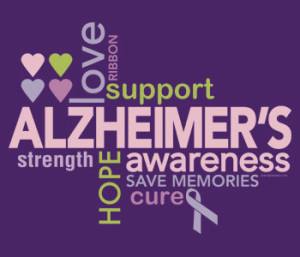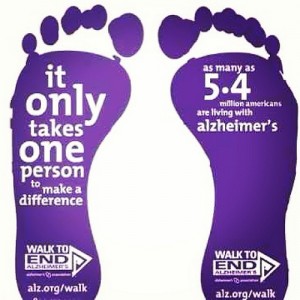Go Purple for Alzheimer’s Awareness Month this November
Did you know this November marks the 30th anniversary of Alzheimer’s Awareness Month? In 1983, President Ronald Reagan backed this national campaign and signed the proclamation that officially declared this month to be National Alzheimer’s Disease Awareness Month (NADAM).
If you’ve been personally affected by this terrible illness, we’d like to share some information on Alzheimer’s disease as well as a few resources that may be of use.

Alzheimer’s is the most common form of dementia. A patient’s memory, thinking and behavior are significantly impacted by this disease. There is no cure for Alzheimer’s, and symptoms get progressively worse over time. Modern treatments can at best slow down this disease’s natural progression.
Dementia is a term used to describe the loss of memory and other cognitive abilities. Advanced stage Alzheimer’s patients have little to no independence and must rely heavily on their caregivers. The illness currently accounts for 50 to 80 percent of all diagnosed cases of dementia.
Early Symptoms of Alzheimer’s Disease
Although there is no cure, it’s important to be aware of the initial signs of Alzheimer’s. Early detection allows patients and their families to get the most benefit out of available therapies (such as taking part in a Alzheimer’s disease clinical trial). It also gives them a chance to take an active role in their healthcare plans before the disease has progressed too far.
Individuals could experience one or more of these early warning signs:
- Memory loss that disrupts daily life – During early stages, people may forget recently learned information and important events. They may ask for the same information repeatedly during the same conversation.
- Issues solving routine challenges – People may have problems concentrating on tasks, and solving routine challenges might take a much longer time. They may not be able to execute a plan of action or work with numbers.
- Losing track of time – Alzheimer’s patients have issues tracking the passage of time. They may confuse dates, seasons, and even location.
- Difficulties with vision and spatial understanding – Visual problems can be a warning sign for dementia. Alzheimer’s patients lose the ability to drive early on.
- Inability to retrace their steps – People misplace things all the time, but someone with Alzheimer’s lacks the ability to retrace the steps they took. This can cause instances of confusion which lead to fear and even irrational anger at others.
- Withdrawal from social interactions or hobbies – Alzheimer’s patients may start to avoid social interactions, hobbies, and work due to the complications or confusion they have experienced.
Please remember that misplacing items or forgetting certain events happen to people all the time. These instances don’t automatically indicate the presence of Alzheimer’s disease.

Wear Some Purple!
The Alzheimer’s Association launched their “Go Purple” awareness initiative this year. Communities are encouraged to wear and display purple during November to show their support. It’s a simple statement that shows others you stand united in the movement to bring an end to Alzheimer’s disease.
Upcoming Awareness Events
Get involved in one of these events to help raise money for Alzheimer’s research initiatives:
- Walk to End Alzheimer’s – This has been the largest Alzheimer’s fundraiser in the nation since 1989. Walks take place in various communities throughout the year. You can register for a walk here.
- The Longest Day – This event is sure to push participants to their limits as they relay from dawn to dusk. Teams take part in a number of different events: running, swimming, biking and even reading. The event is held during the summer on June 21st.
- Hilarity for Charity – Going on its third year, this annual event is hosted by actor Seth Rogen and his wife, Lauren Miller. Hilarity for Charity helps raise funds and awareness around the idea that people should stop thinking of Alzheimer’s as an “old person’s” disease.
We urge you to consider displaying some purple this month to show that you support the fight against Alzheimer’s disease. For more information about this illness or Alzheimer’s Awareness Month, please check out the Alzheimer’s Association’s website.